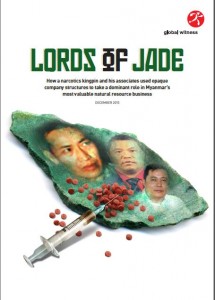Myanmar: Lord of Jade
By Global Witness • December 3, 2015 Myanmar’s jade business may be the biggest natural resource heist in modern history. The sums of money involved are almost incomprehensibly high and the levels of accountability are at rock bottom. One of the most dominant and dangerous groups involved is a collection of companies controlled by Myanmar’s most famous drug lord, Wei Hsueh Kang. This report shows how Wei Hsueh Kang and his associates, following the template of terrorists, kleptocrats and mafia the world over, have used a web of opaque company structures to build, and disguise, a jade empire.
Myanmar’s jade business may be the biggest natural resource heist in modern history. The sums of money involved are almost incomprehensibly high and the levels of accountability are at rock bottom. One of the most dominant and dangerous groups involved is a collection of companies controlled by Myanmar’s most famous drug lord, Wei Hsueh Kang. This report shows how Wei Hsueh Kang and his associates, following the template of terrorists, kleptocrats and mafia the world over, have used a web of opaque company structures to build, and disguise, a jade empire.
Following the election victory of Aung San Suu Kyi’s National League for Democracy party in November 2015, Myanmar’s long-suffering population has a historic opportunity for change. But many obstacles lie ahead. One of the most significant and least understood is the jade business. Jade production was worth up to US$31 billion in 2014 alone: equivalent to almost half Myanmar’s officially recorded GDP. At the same time, the business is substantially controlled by political hardliners who command no popular support but might attempt a comeback or campaign of sabotage if they have the means to finance it. Prising the jade from their grip must be one of the top priorities for the new government if it is to deliver the lasting freedoms, peace and prosperity voters have demanded.
Download the full report in English here.
Tags: 2015 Elections, Aung San Suu Kyi, Business and Human Rights, Crimes against humanity, Drugs, Global Witness, Human Rights, Kachin State, Military Regime, National League for Democracy, Union Solidarity and Development PartyThis post is in: ASEAN, Business and Human Rights, Drugs, Economy, Environmental and Economic Justice, Ethnic Nationalities, Health, Human Rights, Law, Military Regime
Related PostsArmed Forces and Democratization in Myanmar: Why the U.S. Military Should Engage the Tatmadaw
Burma: Country Reports on Human Rights Practices for 2015
Report of the Special Rapporteur on the situation of human rights in Myanmar
Atrocities Prevention Report: Targeting of and Attacks on Members of Religious Groups in Burma
The 2015 Elections and Beyond: Perspectives from villagers in rural southeast Burma/Myanmar









 All posts
All posts